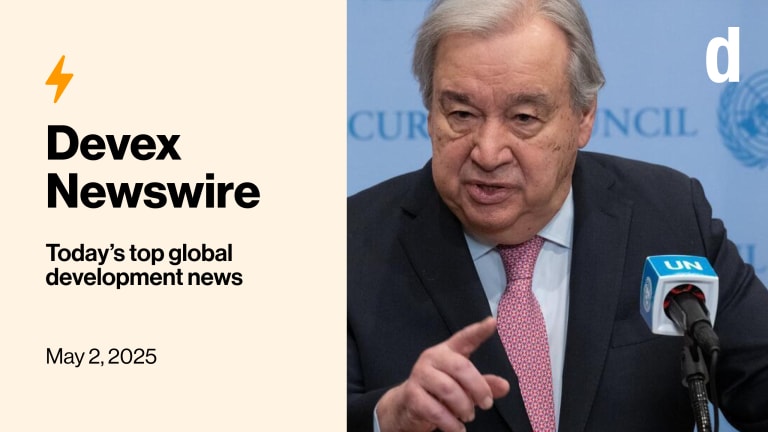The darkest of Jaap van Hierden’s professional days was likely Aug. 19, 2003, when a truck bomb exploded outside the United Nations’ Iraqi headquarters in Baghdad, killing 22 and wounding more than 100.
The team leader of corporate strategy at the United Nations Office for Project Services recalled the day with a heavy heart, noting that some of the victims were staff he was responsible for.
“It is not easy to go through something like that, if you lose people you know very well,” he said.
Yet van Hierden soldiered on. Such is the life of a career U.N. officer.
More than a decade and a half after his first posting, he still hopes “to play a positive role for the U.N., to be an instrument to make this world a better place,” he said.
“I think it is a combination of being naïve, idealistic and adventuresome,” said van Hierden.
The seeds of his adventurous nature were planted in his second year at the Agricultural University in Wageningen, the Netherlands, when he decided to work for an international organization. After graduation in 1990, he successfully applied to the U.N. Junior Professional Officer Program and joined the global body in 1991.
“They offered me to go to Sierra Leone,” he said. “It was a great start.”
Following stints in Thailand and Malaysia as well as Y2K (“millennium bug”) work in New York, he became the UNOPS portfolio manager for several projects in northern Iraq, which he managed from New York. His team set up a program for internally displaced persons and developed an information center that is still being used by the local Iraqi authorities.
“It was a major asset that we left behind there,” he explained, “something which our whole hard working team can be proud of.”
As portfolio manager for UNOPS, van Hierden was also involved in the Asia Pacific Development Information Program run by the U.N. Development Program. The program won the Stockholm Challenge Award, a nonprofit initiative created by the city of Stockholm in partnership with the European Commission. The prestigious award recognizes information technology projects that have generated significant benefits for people and their communities. The APDIP program helped set up the first Internet cafes in Mongolia, introduced Bhutan to the World Wide Web, and resolved an Internet domain name dispute for Bangladesh.
Though responsible for the startup, redirection and overall supervision of the program, van Hierden shies away from credit.
“The APDIP is very rewarding in the sense of what the project has achieved,” he said. “We had major achievements — but to the credit of a much larger team and a strong chief technical advisor. I do not want to take anything away from those who worked hard to make it happen.”
Today as team leader of the UNOPS corporate strategy team, van Hierden oversees matters on corporate performance management, organizational development, strategic budgeting, business analysis, and business development at the Copenhagen-based institution. The unique concept of UNOPS also allows it to work for governments and other international institutions.
UNOPS is a self-financed entity not funded by U.N. member states. At the same time, it serves as the implementing arm of other U.N. agencies, realizing projects in the field and handling procurement.
UNOPS had some lean times around 2002, seven years after becoming an independent service providing organization.
This was “an experiment, which was new to all of us,” acknowledged van Hierden. “We became a bit too visible, not always putting clients first in our communications material.”
UNOPS has since altered its operational perspective.
“Currently, UNOPS is more careful in ensuring that its clients come to the forefront,” van Hierden explained. “Our clients need the visibility more than we.”
The organization wants to spread the message to all U.N. agencies, international organizations and governments that “UNOPS is a capable service provider.” Indeed, the official strategy for UNOPS between 2007 and 2009 is the commitment to become a provider of world-class management services at the United Nations.
“The key element in all of it is hopefully making UNOPS a success as part of wider U.N. effort on aid effectiveness,” said van Hierden, adding that he will never look back “until all of that is fully in place.”
Fortunately, these times aren’t nearly as tough as when van Hierden experienced his lone vocational crisis. While working for UNOPS in Kuala Lumpur in the mid-1990s, he considered entering the private sector. He signed up with a head-hunting company but eventually turned down an attractive offer, instead accepting a position with UNOPS in New York.
“That was a tough decision,” he admitted. “I had to think again why I joined the U.N.”
And what was his answer?
“Trying to help improve the world,” he said. “To have something that you can look back on at the end of your life and say, ‘Yes, I played a role and I tried to make things better.’”




